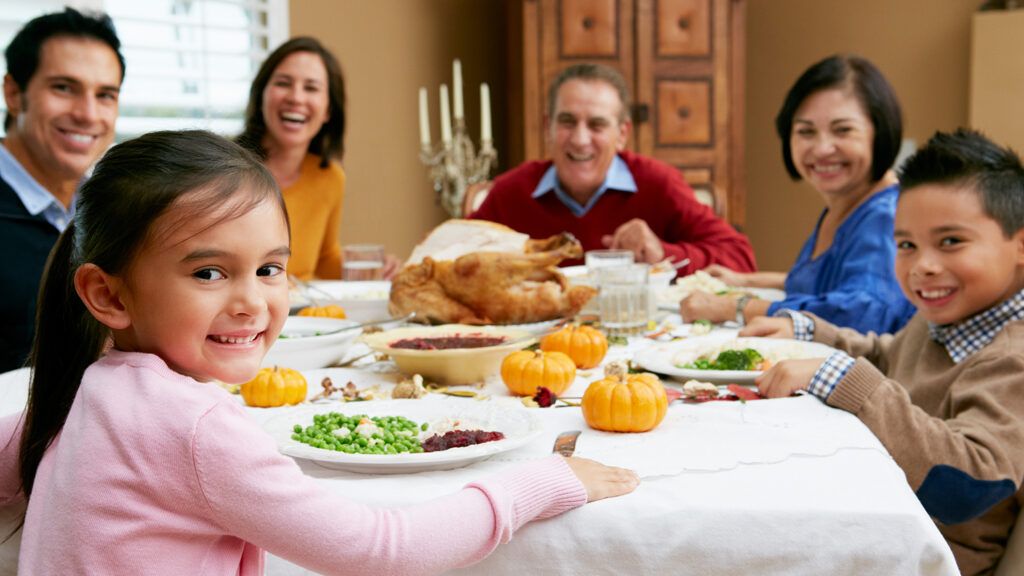Thanksgiving is the day when we feel most grateful for the blessings in our lives. So why do we talk so much about Thanksgiving stress? The food, the family, the travel, the emotions—it can weigh more heavily on us than that second slice of pumpkin pie.
If you’re feeling stress and anxiety as you anticipate Thanksgiving, take comfort. Not only is it normal to experience those feelings, it is also possible to turn them around and reconnect with the gratitude that’s at the heart of this holiday.
Read on for five of the most common Thanksgiving stressors—and how to reorient yourself toward an attitude of gratitude.
Family Tension and Stress
The Stress: When a family gathers around a large table, the iconic Norman Rockwell scene doesn’t always materialize. Relationships that are strained can feel even more so when everyone is in the same room.
Parents and grown children often clash over everything from table manners to when they might expect a new grandbaby. Old arguments—political, emotional, or otherwise—can resurface. For many people, Thanksgiving is a tinderbox of family-related stress.
The Solution: Make a list before Thanksgiving of ways your family triggers negative feelings. Articulating these patterns will help you recognize them before they spin out of control. Then, make a plan to avoid those irritations.
Pledge to politely disengage from tense conversations—step outside for a breath of fresh air, help out in the kitchen, or play a game with the kids. And make an effort to cultivate gentleness and love.
As relationship educator and therapist Dr. Laura Berman advises, “Whether it’s complimenting your always grouchy aunt on her new sweater or telling your exhausted sister that she is a great mom, your words will go a long way in keeping the day positive, meaningful, and full of happiness.”
Thanksgiving Cooking for a Crowd
The Stress: Whether you’re cooking your first Thanksgiving dinner or have been the go-to host for years, it can be stressful to be at the culinary helm. Some family members may have dietary restrictions like veganism. Others might tell you they’re looking forward to a meal exactly Grandma used to make, which makes you feel pressured.
Even if you’re not sweating your menu, Thanksgiving logistics can leave many hosts depleted.
The Solution: Preparing Thanksgiving dinner is a lot of work, and not everything will go exactly according to plan. If you can accept those two realities, your ability to sit down to dinner with a genuine smile on your face will rise significantly.
Start planning early. Create detailed shopping lists. Make and freeze anything you can prepare in advance. Pull out serving dishes and decorations early so you won’t be digging through cabinets with a houseful of guests. Create a timeline for your oven so you have enough space for everything that needs to cook on Thanksgiving Day.
Also, recruit kitchen help mindfully, inviting friends or family members who will encourage you, follow directions, and take initiative when they notice you’ve piled up the silverware but haven’t set the table yet. Don’t forget to take a private moment to feel proud of the gift you have given your family by preparing this meal.
Keeping to a Healthy Food Plan
The Stress: If you struggle with your weight, Thanksgiving is a complicated holiday. You look forward to the foods that have brought you joy and comfort since childhood. But you also recognize those creamy mashed potatoes and rich gravy are dietary danger zones.
Nobody wants to be “on a diet” at Thanksgiving, fielding questions about why you’re not enjoying second helpings. Many people worry that their stress will lead to even more overindulgence.
The Solution: Thanksgiving doesn’t have to be a caloric free-for-all for you to feel satisfied and nourished. Schedule some exercise into your holiday—a brisk walk with a family member is an opportunity for a private chat as well as a healthy break.
Eat breakfast on Thanksgiving morning so you are not famished by the time the turkey arrives. At dinner time, try for as colorful a plate as possible—crimson cranberries, vibrant green beans, orange sweet potatoes, and lean, ivory white meat turkey—to maximize your meal’s nutritional value.
Finally, taste each and every bite, savoring it and gently casting aside any thoughts of guilt. Remember, all things are good, in moderation.
Travel Anxiety
The Stress: Getting from A to B at Thanksgiving time is far more complex than virtually any other time of year. There are more cars on the road if you’re driving, trains are packed, and security lines at the airport are long. Add to that the cost of gasoline or airfare, plus unexpected delays and traffic jams, and it’s no wonder travel is a big source of Thanksgiving stress.
The Solution: Thanksgiving travel is more manageable if you control the things you can, and are flexible with things you can’t. For example, keep a change of clothes, some basic toiletries, mobile device chargers, and extra reading material handy in case you experience delays.
Pack healthy snacks (nuts, fruits, and cut-up vegetables are great choices) to curb stress eating. Leave yourself more time than you think you’ll need to get to the airport or train station. When you feel stress surge, take deep breaths and picture something about Thanksgiving that’s very much worth the journey.
READ MORE: 5 Prayers for Safe Travel
Feeling Lonely or Blue
The Stress: Just because Thanksgiving is a day of celebration doesn’t mean that everyone feels joyful. For those who struggle with their emotional health, feelings of isolation can arise when everyone else appears to be looking forward to a holiday with loved ones.
A person can feel alone whether they’re making Thanksgiving dinner for one or seated at a table full of friends and family members. Those feelings can be exacerbated at a time when happiness is what we are told we’re “supposed” to feel.
The Solution: Acknowledge feelings of sadness and loneliness. Be honest about what’s at the heart of your emotional experience of Thanksgiving.
Step away from social media and television shows that idealize Thanksgiving. It might be comforting to tell yourself Thanksgiving is a day just like any other.
Finally, regardless of whether you are on your own or with a big group, it’s healthy and pleasurable to identify things in your life you are grateful for—large and small. You may also want to turn your emotions over to God and pray for peace and connection in the days to come.
Holly Lebowitz Rossi is a freelance writer based in Arlington, Massachusetts.





